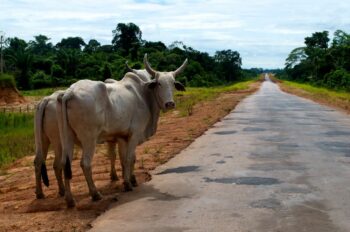Juliana Vélez-Echeverri

Juliana Vélez-Echeverri is a Visiting Senior Fellow at the Grantham Research Institute for Environment and Climate Change at LSE between March 2024 to March 2025.
Background
Juliana Vélez Echeverri is a Research Associate in Climate Litigation at the Oxford Sustainable Law Programme. She holds a PhD in Law from the University of Reading. Juliana specialises in climate change, environmental law and climate justice. Her main areas of interest are social movements and climate litigation. She also researches climate-washing litigation.
Juliana has extensive experience in climate litigation research and practice, as well as investigative journalism. In 2014, Juliana co-founded the Latin-American Centre of Environmental Law (CELEAM). As a CELEAM researcher, she co-designed and coordinated the first research project on climate displacement based on litigation practices in Colombia. Juliana collaborated in bringing the world’s first post-disaster climate displacement case against a government to review by a High Court (Huffington vs Presidencia de la República y otros). Juliana has also worked as a campaigner and research consultant for investigative journalism organisations including Global Witness and ARIA.
Juliana holds a Postgraduate Specialisation in Environmental Law from the Universidad Externado de Colombia, and an Undergraduate Degree in Law from the Universidad de Medellín, Colombia.
Policy
Policy - 2024
This submission presents eight key recommendations for Parties to the UNFCCC which address the priorities of the second dialogue of the UAE Just Transition Work Programme. Read more

News
News - 2024
Tiffanie Chan and Juliana Vélez Echeverri explore the multilateral climate negotiation rooms and national courts to examine how justice is considered in the transition to low-carbon and resilient societies. Read more

In this commentary, Juliana Vélez Echeverri, Catherine Higham and Joana Setzer examine in greater detail the number and nature of climate-washing cases that have been filed to date and assess their outcomes, using data from the Sabin Center for Climate Change Law’s database of climate litigation. Read more


